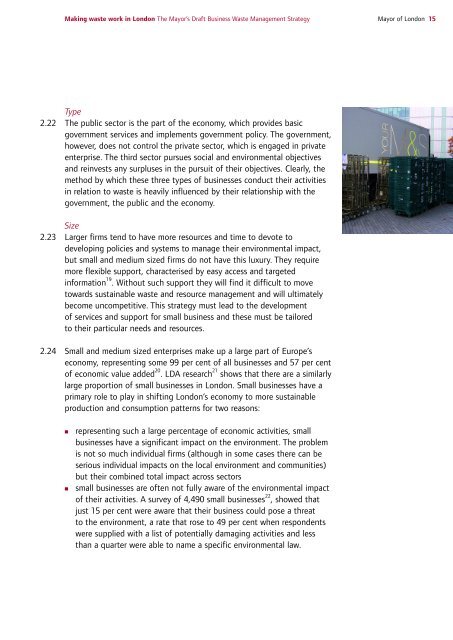Draft Business Waste Strategy PDF - london.gov.uk - Greater ...
Draft Business Waste Strategy PDF - london.gov.uk - Greater ...
Draft Business Waste Strategy PDF - london.gov.uk - Greater ...
Create successful ePaper yourself
Turn your PDF publications into a flip-book with our unique Google optimized e-Paper software.
Making waste work in London The Mayor’s <strong>Draft</strong> <strong>Business</strong> <strong>Waste</strong> Management <strong>Strategy</strong> Mayor of London 15<br />
Type<br />
2.22 The public sector is the part of the economy, which provides basic<br />
<strong>gov</strong>ernment services and implements <strong>gov</strong>ernment policy. The <strong>gov</strong>ernment,<br />
however, does not control the private sector, which is engaged in private<br />
enterprise. The third sector pursues social and environmental objectives<br />
and reinvests any surpluses in the pursuit of their objectives. Clearly, the<br />
method by which these three types of businesses conduct their activities<br />
in relation to waste is heavily influenced by their relationship with the<br />
<strong>gov</strong>ernment, the public and the economy.<br />
Size<br />
2.23 Larger firms tend to have more resources and time to devote to<br />
developing policies and systems to manage their environmental impact,<br />
but small and medium sized firms do not have this luxury. They require<br />
more flexible support, characterised by easy access and targeted<br />
information 19 . Without such support they will find it difficult to move<br />
towards sustainable waste and resource management and will ultimately<br />
become uncompetitive. This strategy must lead to the development<br />
of services and support for small business and these must be tailored<br />
to their particular needs and resources.<br />
2.24 Small and medium sized enterprises make up a large part of Europe’s<br />
economy, representing some 99 per cent of all businesses and 57 per cent<br />
of economic value added 20 . LDA research 21 shows that there are a similarly<br />
large proportion of small businesses in London. Small businesses have a<br />
primary role to play in shifting London’s economy to more sustainable<br />
production and consumption patterns for two reasons:<br />
■ representing such a large percentage of economic activities, small<br />
businesses have a significant impact on the environment. The problem<br />
is not so much individual firms (although in some cases there can be<br />
serious individual impacts on the local environment and communities)<br />
but their combined total impact across sectors<br />
■ small businesses are often not fully aware of the environmental impact<br />
of their activities. A survey of 4,490 small businesses 22 , showed that<br />
just 15 per cent were aware that their business could pose a threat<br />
to the environment, a rate that rose to 49 per cent when respondents<br />
were supplied with a list of potentially damaging activities and less<br />
than a quarter were able to name a specific environmental law.
















